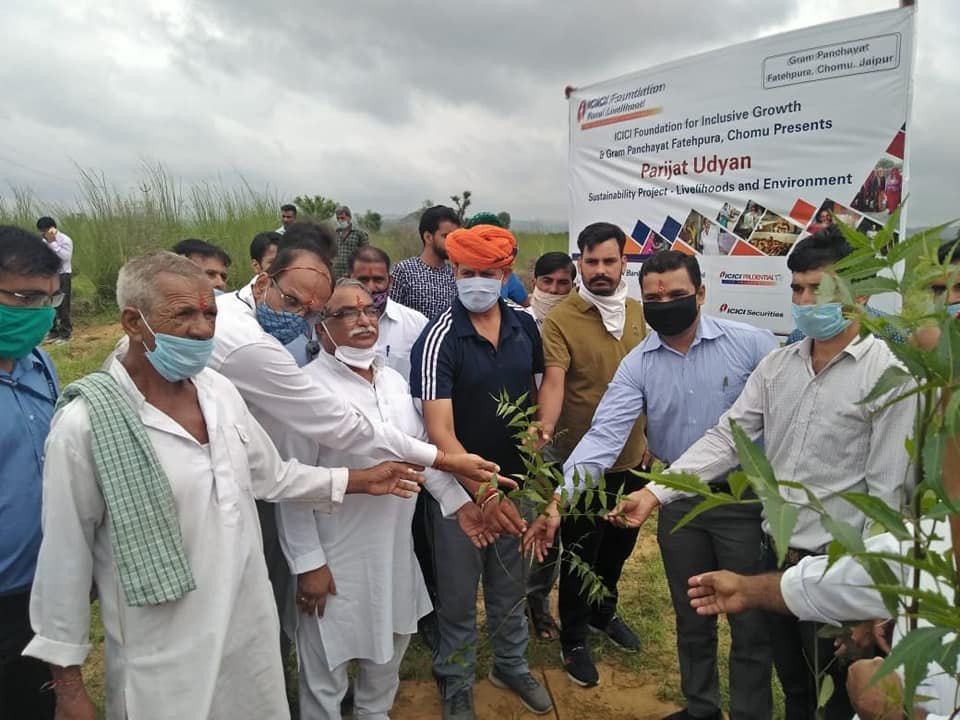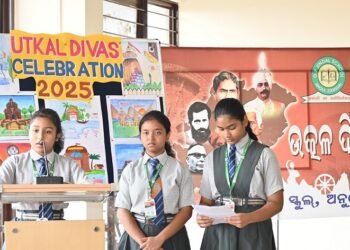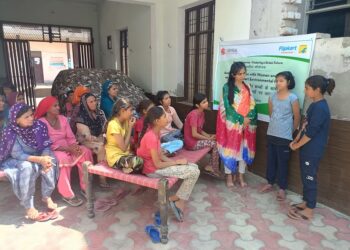RIL through its CSR arm Reliance Foundation has enabled reclamation of about 6600 hectares of wasteland in the states of Telangana and Andhra Pradesh. The reclamation has allowed for farmers in about 2300 hectares to even raise two to three crops from the said land.
Under the foundation’s watchful eye, over 2.3 billion litres of rainwater harvesting capacity was created through various structures to support nearly 1,000 hectares of land in Telangana villages and 11 villages have been made drinking water secure. Additionally, Reliance nutrition gardens were established to support 2,300 people across 13 villages in Telangana and they get fresh vegetables and fruits at their doorstep.
India houses 16% of the world population in about 2% of the total land area of the world. The pressure on the land is often beyond its carrying capacity.
Therefore, the productive lands, especially the farmlands in India are in the constant process of various degrees of degradation and are fast turning into wastelands. This makes the reclamation of this wasteland very important.
At present, approximately 68.35 million hectare area of the land is lying as wastelands in India. Out of these lands, approximately 50% lands are such non-forest lands, which can be made fertile again if treated properly. Taking up this cause under the ambit of CSR, India Inc has been working towards reclaiming these wastelands and turning them more productive.
Hindustan Zinc Mines
Hindustan Zinc Limited (HZL), as part of its CSR initiatives undertook a wasteland reclamation project in Rajasthan. Over 10 hectares of land within the Rajpura Dariba Mine has been developed as Biodiversity Park, wherein more than 50,000 plants of 42 different species were planted. Earlier the entire area was covered with invasive species, after soil enrichment and conditioning, the area has now been converted into a green land.

The Chanderiya Lead Zinc Smelter team in collaboration with TERI (The Energy and Research Institute) has used Mycorrhiza technology for the development of 3-hectare Green area on its exhausted Jarofix Waste yard. The Mycorrhiza technology is a symbiotic association between a plant and a fungus, where the plant provides food for the fungus and the fungus draws nutrients from the soil and adds to the improvement of cultivation processes, rejuvenation of fertile soils, and reclamation of wasteland into productive land in a sustainable manner. For the project, the company has won the ‘Most Innovative Environmental Project Award’ in the renowned CII National Award for Environmental Best Practices 2021.
ICICI Bank in Rajasthan
The project aims to convert 125 acres of wasteland into orchards and forest. The project is expected to provide sustainable livelihoods to 3,500 landless and marginalised villagers through multiple initiatives such as creating a forest comprising native tree varieties, grasslands for grazing, organic farming, plant nursery, fruit and herbal-medicinal farming, honeybee for pollination and honey.

The Foundation has undertaken this initiative along with the Panchayat Samiti of the village. ICICI Foundation provided 11,000 saplings of native varieties of plants and trees, while the land preparation was carried out under Mahatma Gandhi National Rural Employment Guarantee Act (MGNREGA) by the Gram Panchayat. ICICI Foundation Rural Livelihood Programme implemented other environment-friendly Beneficiaries at a ‘Custard Apple Plantation’ drive at ICICI RSETI, Udaipur Afforestation drive at Parijat Udyan at Fatehpura village in Jaipur district, Rajasthan better prices. Further, it set up processing centres to expand the shelf life of the fruit.
Large ice-cream and squash brands have started sourcing pulp from these centres which are operated by tribal women. Similar value chains have been set up for other locally available produce like Indian Gooseberry (Amla) and Java Plum (Jamun). measures like a solar-powered borewell, an artificial water body for rainwater harvesting, drip irrigation and bio-toilets for villagers.
📢 Partner with India CSR
Are you looking to publish high-quality blogs or insert relevant backlinks on a leading CSR and sustainability platform? India CSR welcomes business and corporate partnership proposals for guest posting, sponsored content, and contextual link insertions in existing or new articles. Reach our highly engaged audience of business leaders, CSR professionals, NGOs, and policy influencers.
📩 Contact us at: biz@indiacsr.in
🌐 Visit: www.indiacsr.in
Let’s collaborate to amplify your brand’s impact in the CSR and ESG ecosystem.






























